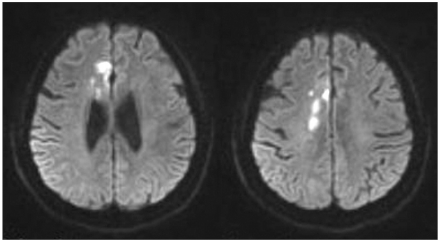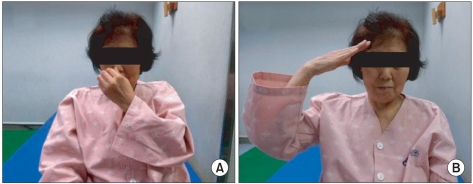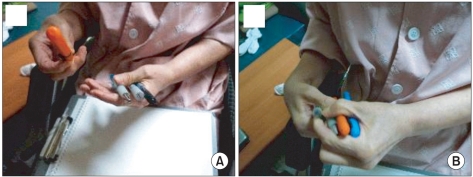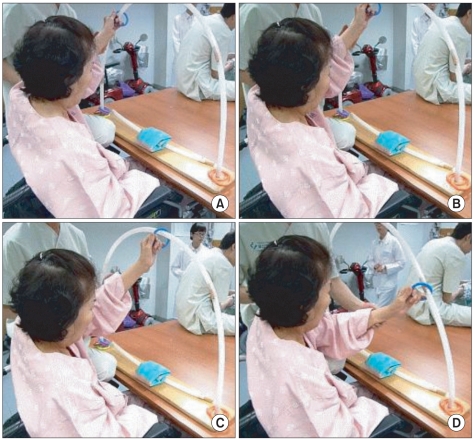Ann Rehabil Med.
2011 Dec;35(6):949-953. 10.5535/arm.2011.35.6.949.
Crossed Transcortical Motor Aphasia, Left Spatial Neglect, and Limb and Magnetic Apraxia Due to Right Anterior Cerebral Artery Infarction
- Affiliations
-
- 1Department of Rehabilitation Medicine, National Health Insurance Corporation Ilsan Hospital, Ilsan 410-719, Korea. khan1013@hanmail.net
- KMID: 2266824
- DOI: http://doi.org/10.5535/arm.2011.35.6.949
Abstract
- Crossed aphasia refers to language disturbance due to right-hemisphere lesions in right-handed individuals, while magnetic apraxia is described as 'forced grasping and groping' caused by lesions in the contralateral frontal lobe. This is a case report of a 70-year-old right handed woman who suffered from crossed transcortical motor aphasia and left hand magnetic apraxia due to right anterior cerebral artery infarction. The definite mechanism of this disorder is not yet understood, but neurophysiological observations suggest that affected supplementary motor areas may be responsible for this phenomenon.
MeSH Terms
Figure
Cited by 1 articles
-
Crossed Aphasia after Right Corpus Callosum Infarction: a Case Report
Ho Sang Yoo, Hyoung Seop Kim
Brain Neurorehabil. 2019;12(1):. doi: 10.12786/bn.2019.12.e6.
Reference
-
1. Coppens P, Hungerford S, Yamaguchi S, Yamadori A. Crossed aphasia: an analysis of the symptoms, their frequency, and a comparison with left-hemisphere aphasia symptomatology. Brain Lang. 2002; 83:425–463. PMID: 12468397.
Article2. Rho HJ, Kim YW, Park CI, Park JB, Jang JH. Nonfluent crossed aphasia after right middle cerebral artery infarction: a case report. J Korean Acad Rehabil Med. 2007; 31:772–775.3. Gillen G. Burkhardt A, editor. Stroke rehabilitation: a function-based approach. 1998. 1st ed. St Louis: Mosby;p. 161–184.5. Papagno C, Della Sala S, Basso A. Ideomotor apraxia without aphasia and aphasia without apraxia: the anatomical support for a double dissociation. J Neurol Neurosurg Psychiatry. 1993; 56:286–289. PMID: 7681472.
Article6. McNabb AW, Carroll WM, Mastaglia FL. "Alien hand" and loss of bimanual coordination after dominant anterior cerebral artery territory infarction. J Neurol Neurosurg Psychiatry. 1988; 51:218–222. PMID: 3346686.
Article7. Annett M, Alexander MP. Atypical cerebral dominance: predictions and tests of the right shift theory. Neuropsychologia. 1996; 34:1215–1227. PMID: 8951833.
Article8. Alexander MP, Annett M. Crossed aphasia and related anomalies of cerebral organization: case reports and a genetic hypothesis. Brain Lang. 1996; 55:213–239. PMID: 8939302.
Article





